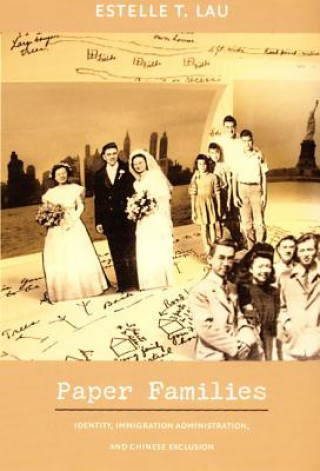
Dostawa
Doradca ds. zakupów





Jednak się nie przyda? Nic nie szkodzi! U nas możesz zwrócić towar do 30 dni
 Bon prezentowy
O dowolnej wartości
Bon prezentowy
O dowolnej wartości
Bon prezentowy to zawsze dobry pomysł. Obdarowany może za bon prezentowy wybrać cokolwiek z naszej oferty.
Paper Families
 Angielski
Angielski
 76 b
76 b
 common.delivery_to
common.delivery_to
30 dni na zwrot towaru


The Chinese Exclusion Act of 1882 marked the beginning of restrictive U.S. immigration policy and made the Chinese the first immigrant group officially excluded from the United States. In "Paper Families", Estelle T. Lau examines the history of Chinese exclusion, demonstrating how it affected Chinese American communities and the development of U.S. immigration policies and practices. Through the enforcement of the Exclusion Act and subsequent legislation, the U.S. immigration service developed new forms of record keeping and identification practices that later became a standardized part of the process regulating entry into the United States.In order to bypass these restrictions, Chinese Americans took advantage of the system's loophole: children of U.S. citizens were granted automatic eligibility for immigration. The result was an elaborate system of 'paper families', in which Chinese Americans pretended that individuals brought from China were their children. This subterfuge necessitated the creation of 'crib sheets' outlining genealogies and providing village maps and other essential information that could be used during administrative processing and INS investigations.Drawing on immigration case files, legislative materials, and transcripts of interviews and court proceedings, Lau reveals immigration as an interactive process. Chinese immigrants and their U.S. families were subject to regulation and surveillance, but they also manipulated and thwarted those regulations, forcing the U.S. government to adapt its practices and policies. Lau points out that the Exclusion Acts and the pseudo-familial structures that emerged in response to them have had lasting effects on Chinese American identity. She concludes with a look at exclusion's legacy, including the Confession Program of the 1960s that coerced people into divulging the names of paper family members and efforts made by Chinese American communities to recover their lost family histories.
Informacje o książce
 Angielski
Angielski
Kategoria




 Jak kupować
Jak kupować














